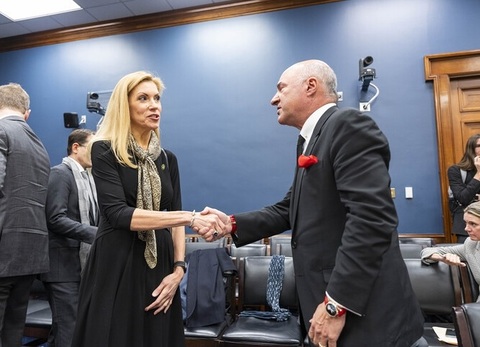WASHINGTON – “Shark Tank” investor and venture capitalist Kevin O’Leary urged House members on Thursday to oppose a set of proposed bank regulations that he said would harm small businesses’ access to lending.
The set of regulations, titled Basel III, would require banks to increase the amount of capital they hold by an estimated 20% on average. This extra amount that banks would have to set aside would not be available to loan out to small businesses, according to a House Small Business Committee memo.
“It’s a bad policy,” O’Leary, who has the nickname “Mr. Wonderful” on the ABC series, told the committee. He said that he felt the needs of small businesses were not taken into consideration when the regulations were being written.
Basel III is the third standard proposed by the international Basel Committee on Banking Supervision, which was created after the 2008 crisis to address the risks financial institutions posed to the global economy. The Federal Reserve has faced increased pressure to implement the regulations especially after the Silicon Valley Bank crash in March 2023.
The only committee member who spoke out in support of Basel III was ranking member Nydia Velázquez (D-N.Y.), who contended that the regulations would not hurt small businesses as much as other lawmakers stated.
“The proposed rule is just that – a proposal,” Velázquez said. “There are more than 4,500 banks in this country and less than 40% of them will be directly affected by the rule.”
Still, some experts have made the argument that community banks not directly affected by Basel III would still be indirectly affected by hampering their ability to receive money from larger banks.
Everett Sands, the founder and CEO of Lendistry, a fintech firm, urged the Federal Reserve to postpone adoption of Basel III.
“It will start at the top banks, it will then trickle down into community banks, it will then trickle down into community development financial institutions (CDFIs), and afterwards it then, obviously, would go to small businesses,” Sands said. “It is not ready for the current environment we are in today.”
Lendistry is a CDFI, or an institution that aims to lend money to people in communities who are less likely to have consistent access to lending like minorities, women and rural residents.
Rep. Morgan McGarvey (D-Ky.) noted that CDFIs may receive less funding from big banks under the Basel III regulations because they are perceived as “higher risk.” Sands added that even though there would be a perceived risk, data shows that it is “not reality.”
Many small business owners have begun to look for other avenues of funding, primarily venture capitalists.
Rep. Jake Ellzey (R-Texas), however, said that isn’t the best option for small companies. He said he was particularly concerned about family businesses where owners would not want to sell a part of their “heart and soul” to stay open in search of venture capital money.
O’Leary, a venture capitalist himself, said that this option is also becoming less viable.
Venture capital funding has declined 39% in the past 24 months because of inflation’s impact, he said.
“I would go as far as to say that right now, venture capital is dead,” O’Leary said. “The typical VC firm today is not worried about new deals; they’re trying to determine in their portfolios, which one should survive and which one’s they’re going to let die.”
Many in the banking industry said that the prospect of new regulations has discouraged many small business owners from continuing operations. According to a survey from Goldman Sachs of small businesses, if Basel III is finalized, 67% plan to halt expansion, 42% to lay off workers or stop hiring and 21% plan on closing their businesses.
Jill Bommarito, owner of Ethel’s Baking Company, a gluten-free bakery based in Michigan, told lawmakers Basel III is one more policy in a set of many that ignores the needs of small businesses.
“This rule would not only cut off small businesses from accessing the capital they need to grow, but it will push small business owners to predatory lenders,” Bommarito said. “As a small business… you don’t feel you matter.”



